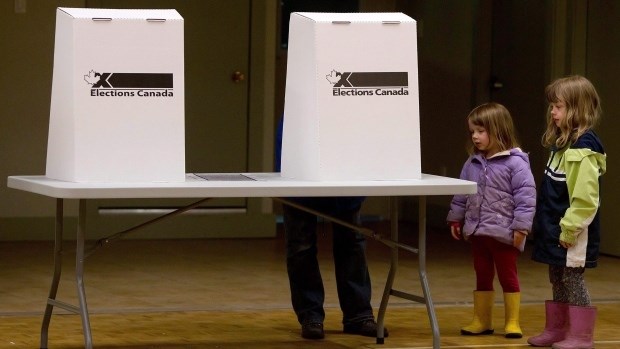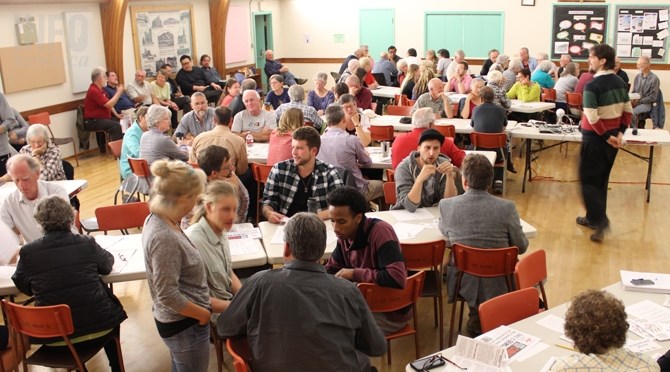
Image Credit: THE CANADIAN PRESS/Darryl Dyck
September 22, 2016 - 9:00 PM
THOMPSON-OKANAGAN - The essential piece to any democracy is voting so it's a big deal that the Canadian government is looking at changing how that works. While it appears we won't be formally asked through a referendum about the change, the ruling Liberal Party of Canada wants to hear your point of view.
While most Canadians have probably never participated in a system other than our version of First Past the Post, many other countries have moved to different systems. And while First Past the Post remains the most common, more and more governments are moving away from it.
Critics of First Past the Post point out the system works well for a two-party system, like in the USA, but when more parties exist it’s often not effective at reflecting the wishes of the citizens. It can even force a country into becoming a two-party system over time.
An organization critical of the current system, Fair Vote Canada, points out on its website the Liberal Party of Canada has a majority in Ottawa with 39 per cent of the popular vote. While nearly seven million Canadians wanted a Liberal government, more than 10.5 million voters preferred someone else, and that doesn’t even get into the issue of voter apathy.
The largest group of voters in the election was actually those who didn’t vote, with 31.7 per cent of those allowed to vote skipping the election booth. Proponents of electoral reform say voter turnout will likely increase with a new system because more people feel empowered through the ballot box, instead of viewing it as wasted time if their choice for a party isn’t likely to win.
While the 2015 election ended with 184 seats for the Liberal Party, 99 for the Conservatives, 44 for the NDP, 10 for the Bloc Quebecois and 1 for the Green Party, that doesn’t match with the popular vote. If the 338 seats in Ottawa were redistributed by the national popular vote, the Liberal Party wouldn’t have the majority they enjoy now. Instead, they’d have roughly 132 seats, while the Conservatives would be up to 108, the NDP 67, the Bloc up to 15 and the Green Party would get 11 seats. That’s closer to what proponents of electoral reform want, for Parliament to more closely reflect the popular vote.
Looking closer to home, there are some 94,000 voters in the Kamloops riding and roughly 67,000 of them voted in the 2015 election, with less than 25,000 seeing their candidate win, which means around 26 per cent of the voting population saw their candidate go to Ottawa. In the Kelowna-Lake Country riding the result was closer to the popular choice, with 46 per cent of voters casting a ballot for the local Liberal candidate, who eventually won, but still only a third of eligible voters chose him.
In the North Okanagan, Central Okanagan and South Okanagan ridings each of the winning candidates had support from less than 40 per cent of the ballots and less than a third of eligible voters. All the Thompson-Okangan ridings have about 90,000 people in them with around 25,000 to 29,000 choosing the riding's federal representative.
Matt Greenwood is a former federal Green Party candidate and part of the Kamloops-Thompson-Cariboo Electoral Committee, a group submitting comments on electoral reform to the federal government. He points out that if a candidate doesn’t win in the riding, the votes cast for her or him don’t count for anything.

A Kamloops-Thompson Cariboo Electoral Committee event Sept. 12 was attended by around 90 people.
(BRENDAN KERGIN / iNFOnews.ca)
“When you consider we’re in a riding where literally two-thirds of the people who voted last election may as well have stayed home and not bothered for all the difference made to the result... of course there are going to be some people who are unhappy with the system we’re using," he says.
While one person or party may receive more votes than any other single party in an election, rarely do they have more votes than all other contenders put together, which leaves the majority of people unhappy with the result.
The simplicity of First Past the Post is probably the strongest argument for it. Every one can understand it as a basic competition. However, there’s a strong argument that says the nation’s leadership should not be determined by a simple competition.
If Canada was to evolve, we wouldn’t be breaking new ground. Many other countries use systems other than First Past the Post. According to the Institute for Democracy and Electoral Assistance, Australia, France, Germany and Japan all use different systems from Canada and each other.
There are three basic systems being discussed for Canada.
The first has been considered in B.C. Provincial referendums were held in 2005 and 2009 calling for a version of the Single Transferable Vote system. Both times it was defeated. In 2005, while 57.7 per cent of voters agreed with the proposed change, it required 60 per cent to past. The 2009 referendum ended with 39 per cent of voters in favour of change. Single transferable voting is also being considered for the country. It’s similar to the alternate vote system, but has multiple candidates elected from a single region. In Canada, these regions could be enlarged from the current ridings so that a similar number of MPs are elected. Ireland currently uses this system.
Alternate Vote, also known as a ranked ballot or instant runoff voting, is the next simplest to First Past the Post. Essentially, instead of choosing one candidate, a voter ranks as many or as few of the candidates in their riding as they want. It would require the fewest alterations to Canada’s current system, is used in Australia, and the Liberal Party voiced support for it in the spring.
The third option — and most popular internationally after First Past the Post — is the Mixed Member Proportional Representation system, of which there are a few versions. Basically two different voting systems are used, one to elect a local representative, and one to help balance out party representation over a larger geographic area. Versions of this are used in Germany, New Zealand and Mexico.
Each version is different, and a version for Canada has been developed, according to Fair Vote Canada, called Rural-Urban Proportional Representation. Proponents of this version favour it due to the Canada’s mix of large rural areas and urban centres where the majority of Canadians live.
In the Thompson-Okanagan region some local groups and MPs have held townhalls and public consultations to collect inormation about electoral reform. In Kamloops there were two prongs, with MP Cathy McLeod surveying her electorate to gauge feelings about a referendum and holding round table meetings to discuss it. The Kamloops-Thompson-Cariboo Eletoral Committee, founded by former federal Liberal candidate Murray Todd, but run as a non-partisan organization with participation from multiple parties.
In the Kelowna and South Okanagan ridings MPs held townhall meetings to collect feedback from their electorate. In the North Okanagan riding, Conservative MP Mel Arnold reached out for feedback via mail while the Liberal riding association took it on themselves to hold meetings. In the Central Okanagan riding no public groups held information or public consultation meetings.
To add your voice to the conversation or to learn more about the federal electoral committee, click here. The public has until October 7 to send in comments. The federal committee has announced it is travelling the country for feedback and some dates around Western Canada with the closest meeting Wednesday, Sept. 28 in Vancouver. A final report will be written after Oct. 7 and presented no later than Dec. 1.
To contact a reporter for this story, email Brendan Kergin or call 250-819-6089 or email the editor. You can also submit photos, videos or news tips to the newsroom and be entered to win a monthly prize draw.
We welcome your comments and opinions on our stories but play nice. We won't censor or delete comments unless they contain off-topic statements or links, unnecessary vulgarity, false facts, spam or obviously fake profiles. If you have any concerns about what you see in comments, email the editor in the link above.
News from © iNFOnews, 2016